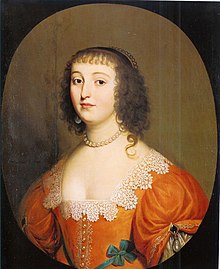Elisabeth of the Palatinate
| Princess Elisabeth | |
|---|---|
| Princess-Abbess of Herford Abbey | |
 |
|
| Princess-Abbess of Herford | |
| Reign | 29 March 1667 – 11 February 1680 |
| Predecessor | Elizabeth II |
| Successor | Elizabeth IV |
| Born |
26 December 1618 Heidelberg, Electorate of the Palatinate |
| Died | 11 February 1680 (aged 61) Herford Abbey |
| House | House of Palatinate-Simmern |
| Father | Frederick V, Elector Palatine |
| Mother | Elizabeth Stuart |
| Religion | Calvinist |
Elisabeth of the Palatinate (26 December 1618 – 11 February 1680), also known as Elisabeth of Bohemia, Princess Elisabeth of the Palatinate, or Princess-Abbess of Herford Abbey, was the eldest daughter of Frederick V, Elector Palatine (who was briefly King of Bohemia), and Elizabeth Stuart. She was born in Heidelberg, Germany, spending the first nine years of her life there. When she was nine, she went to live in Leyden, Holland, with her brother and was raised in a nursery palace to complete her studies. After finishing her studies, she was deemed ready to live in The Hague with her mother.
Elisabeth was sent back to live in Germany and then eventually took her vows in a Protestant convent at Herford Abbey in Westphalia as Princess-Abbess. During her days as head of the Abbey, she provided refuge for many Protestants during a time of great persecution.
She influenced many key figures and philosophers, most notably René Descartes. She is most famous for questioning Descartes' idea of Dualism, or the mind being separate from the body, in addition to questioning his theories regarding communication between the mind and body. The written correspondence of Descartes and Elisabeth is regarded as an important philosophical document, giving insight into the theoretical debates of the 17th century.
Elisabeth was known for her intelligent and caring nature. She died in 1680 after suffering from a painful illness for several years.
After the overthrow of her father, her earliest youth was spent at Berlin, under the care of her grandmother Juliana, a daughter of William of Orange, who gave her thoughts a lofty and pious direction. Elisabeth was known and revered by the people around her for her intelligence. Known as "La Grecque" ("The Greek"), she was fluent in multiple languages, including Latin. She had a particular aptness for the classical languages. She was very well rounded, obtaining an education in history, geography, and mathematics. It is said that she also dabbled in the fine arts, such as painting, dancing, and poetry. Elisabeth was taught by her mother, her grandmother, and various tutors throughout the various stages of her life. In her ninth or tenth year she was sent with her siblings to complete her education in Leiden, Netherlands. Afterwards she moved to The Hague, where her parents kept a quiet court surrounded by a select circle of noble and educated men.
...
Wikipedia
